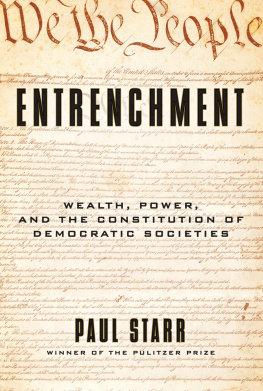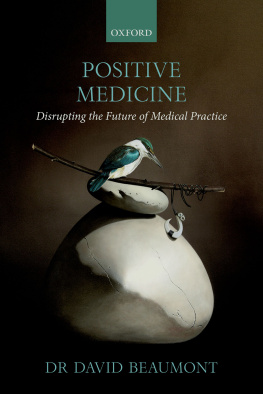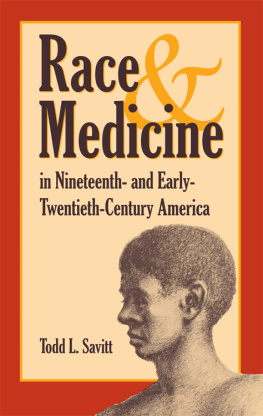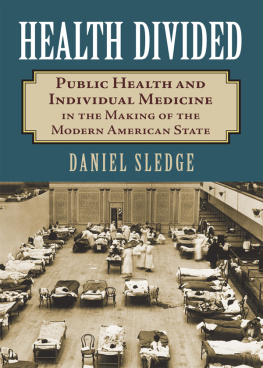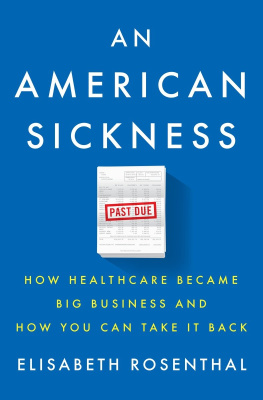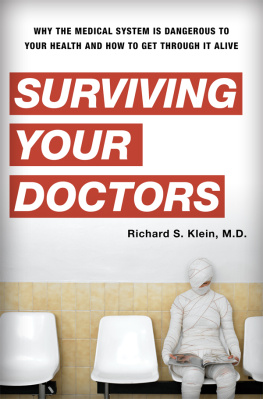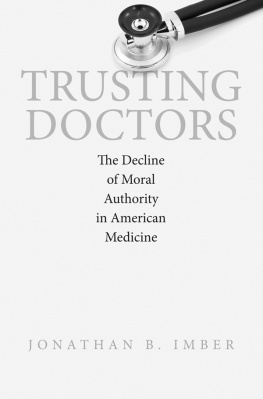The Social Transformation
of American Medicine

To the Memory of My Father
Library of Congress Cataloging in Publication Data
Starr, Paul, 1949
The social transformation of American medicine.
Includes bibliographical references and index.
1. Medical careUnited StatesHistory. 2. Social medicineUnited StatesHistory. 3. PhysiciansUnited StatesHistory. I. Title. [DNLM: 1. History of medicine, ModernUnited States. WZ 70 AA1 S7s]
RA395.A3S77 1982 305.9610973 81-68412
ISBN 978-0-7867-2545-8
Copyright 1982 by Paul Starr
Designed by Vincent Torre
DHAD 03 04 05 50 49 48 47 46 45 44 43 42
CONTENTS
I HAVE DIVIDED this history into two books to emphasize two long movements in the development of American medicine: first, the rise of professional sovereignty; and second, the transformation of medicine into an industry and the growing, though still unsettled, role of corporations and the state. Within this framework I explore a variety of specific questions, such as:
why Americans, who were wary of medical authority in the early and mid-nineteenth century, became devoted to it in the twentieth;
how American doctors, who were bitterly divided and financially insecure in the nineteenth century, became a united and prosperous profession in the twentieth;
why hospitals, medical schools, clinics, and other organizations assumed distinctive institutional forms in the United States;
why hospitals became the central institutions in medical care;
why public health did not;
why there is no national health insurance in the United States;
why Blue Cross and commercial indemnity insurance, rather than other types of health plans, dominated the private insurance market;
why the federal government in recent years shifted from policies that encouraged growth without changes in the organization of medical care to policies that encouraged reorganization to control growth;
why physicians long escaped from the control of the modern corporation, but are now witnessing and indeed taking part in the creation of corporate health care systems.
This last question became more salient while this book was in progress. When I began work in 1974, it was widely thought that medical schools, planners, and administrators were emerging as the chief counterweight to private physicians. Government seemed to be assuming a major, perhaps dominant role in the organization of medical care. Decisions that had formerly been private and professional were becoming public and political. Eight years later this is no longer clearly the direction of change, but neither is the status quo ante being restored. Private corporations are gaining a more powerful position in American medicine; if leading members of the Reagan administration have their way, the future may well belong to corporate medicine. However, the origins of this development precede the current administration; the force behind it is more powerful than the changing fashions in Washington. Precisely because of what is now taking place, it has become more necessary to understand medicine as a business as well as a cultural phenomenonand perhaps most important, to understand the relation between the two.
Many of the chapters dealing with these and other problems can be read almost as self-contained studies. However, my primary intention in writing this volume has been to provide an integrated account of the social and economic development of medicine in America. I have tried to present an interpretation that makes sense in terms of the broader historical patterns in our culture, economy, and politics.
All the chapters refer back, moreover, to the arguments adumbrated in the Introduction about the relation of knowledge and power and the nature and uses of authority. The opening theoretical passages, I recognize, may be a barrier rather than an invitation to some readers. I ask their patience. My aim in the Introduction is to place the analysis in the context in which I think it belongs; to define my terms; and to provide an analytical map that may serve as a guide through the chief turns of the argument, at least in , where the journey begins. The point of my concern with authority and economic power will, I hope, shortly become clear.
In writing this volume, I have not assumed the reader would necessarily be acquainted with the history, economics, or sociology of medicine. Therefore, I have tried to provide as much background as necessary to make the story clear and to enable the analysis to stand on its own, without leaving gaps that could only be filled by reading further in the literature. But should the reader wish to learn more, the notes provide references to additional sources. The notes also, of course, identify the extent of my debts to other scholars as well as some of my differences with them. In the interests of straightforward exposition, I have tried to leave the text relatively unencumbered with polemic.
The reader who expects to find a political program here will be disappointed. This omission is not a reflection of any indifference on my part, nor a pose of neutrality. I have written elsewhere on more immediate questions of policy, and it will scarcely require a cryptographer to decipher my sentiments, especially in some of the final chapters. But history does not provide any answers about what should be done. Were I to take up problems of political choice, it would require me to speak here in a different voice and, indeed, to write another book. My hope is that this historical analysis may help to illuminate our present predicament, even for people of divergent sympathies. I have sought to trace not only the origins of the institutions and policies that are with us today, but also the fate of those that failed or were defeated or stunted in their development. I would not be sorry if these analyses of roads not taken served as a reminder that the past had other possibilities, and so do we today.
Cambridge, Mass.
August 1982
THIS BOOK was written in the old-fashioned way: the lone scholar pecking away at his word processor. But like many solo practitioners, I had the benefit of consultations with colleagues and the resources of some large institutions at my disposal. Without them my work would have been impossible.
For any serious research and reflection, there is no substitute for timetime left wholly to ones own organization. Without the three years provided to me by the Society of Fellows at Harvard between 1975 and 1978, this book could not have been written. I am also indebted to the Commonwealth Fund for support while I was a Fellow in Law, Science, and Medicine at Yale Law School in 19741975, when I was beginning this work; and to the John Simon Guggenheim Memorial Foundation for support while I was a visitor at Yales Institution for Social and Policy Studies in 19811982, when the final editorial work was, belatedly, completed. And to those who were my teachers and are now my colleagues in the Department of Sociology at Harvard, I am also obligedfor their advice, confidence, and encouragement. To Daniel Bell I owe a special debt, for the example that his range of knowledge constantly provides, as well as for the line-by-line attention he paid some time ago to an earlier draft of what is now .
Over the years more people than I can now faithfully recall gave me counsel, criticized drafts of chapters, or simply heard me out while I carried on about my research. I would particularly like to thank Joan Lidoff, Michael Schudson, Jerry Avorn, Peter Temin, Kenneth Ludmerer, John Harley Warner, Morris Vogel, Mark Blumberg, John Simon, George Silver, and Daniel Fox.
Next page

